|
|
|
Sort Order |
|
|
|
Items / Page
|
|
|
|
|
|
|
| Srl | Item |
| 1 |
ID:
164031
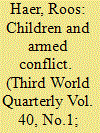

|
|
|
|
|
| Summary/Abstract |
Children are currently being recruited to an increasing extent by armed groups, assuming both ancillary and combat roles. Academic research on this phenomenon has grown in scope over the last few years. However, the current research lacks a comparative perspective. As a result, we presently have a very restricted perspective of the state of the art on the subject of child soldiering, making it difficult to recognise research areas that urgently require further investigation. The ambition of this article is twofold: first, to explore the existing state of child soldier studies across disciplines, and second, to encourage potential research by highlighting three relatively underdeveloped research areas.
|
|
|
|
|
|
|
|
|
|
|
|
|
|
|
|
| 2 |
ID:
164034
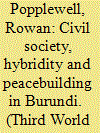

|
|
|
|
|
| Summary/Abstract |
Critics argue that liberal peacebuilding has resulted in the creation of a civil society populated with organisations that are artificial and externalised. These associations are contrasted with more locally-based groups that are considered to be more authentic and better able to build a hybrid peace that is emancipatory. At first glance, this characterisation appears to describe civil society in post-war Burundi, but on closer inspection a much more complex and interesting picture is revealed which challenges existing conceptualisations of post-conflict civil society. The paper finds that even associations that are deeply rooted in local communities are composites forged through their encounters with the global. Furthermore, this hybridity is not new. Rather it is the product of decades of prior hybridisation, raising important questions about the authenticity and legitimacy of these organisations and, ultimately, their ability to promote a peace that is transformative.
|
|
|
|
|
|
|
|
|
|
|
|
|
|
|
|
| 3 |
ID:
164032
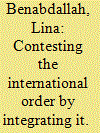

|
|
|
|
|
| Summary/Abstract |
What does the Belt and Road initiative (BRI) tell us about China’s perceptions of the international order? This paper takes an inductive approach by examining the BRI for a two-pronged purpose: first, to understand China’s perception of the international order by examining Beijing’s official discourse around its intentions and vision for the initiative; and, second, to examine the mechanisms through which Chinese norms are diffused and normalised in Global South states. I find that Chinese policy navigates a dialectical interchange between upholding the existing international order while simultaneously promoting alternative norms and practices to reform parts of the order that are unsatisfactory to Chinese interests. To answer the second part of the puzzle, the paper finds that a central socialisation mechanism in China’s foreign policy for Global South states occurs through professionalisation training programmes. These programmes allow for Chinese expert knowledge and technical know-how to be shared with and mimicked by elites and civil servants across many Global South states.
|
|
|
|
|
|
|
|
|
|
|
|
|
|
|
|
| 4 |
ID:
164029
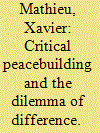

|
|
|
|
|
| Summary/Abstract |
Recent research has revealed the need to include and understand local actors in order to improve the effectiveness of peacebuilding. According to these analyses, peacebuilding could become more respectful of cultural differences thanks to a genuine engagement with the specificities of the local. Empirical studies of the ‘different’ local have thus flourished in the field with the ambition of countering the universalist tendency of traditional peacebuilding. Through the use of the concept of ‘dilemma of difference’, this article challenges this intuitive argument and argues that these approaches risk reproducing a stigma attached to the ‘different’ local. Indeed, emphasising difference in order to ensure its respect means separating and reifying ‘it’ as a deviation from the norm(al). As such, this analytical strategy is likely to recreate the stigma that contributed to the exclusion of local actors in previous peacebuilding practice and research. In contrast, I outline three strategies for studying difference differently in peacebuilding: focusing on the institutional arrangements that enabled specific differences to emerge and become visible; recognising that these differences are internal to peacebuilding (and thus an unlikely source of alternative and emancipation); and revealing the unstated and implicit Self for/from whom local difference is relevant.
|
|
|
|
|
|
|
|
|
|
|
|
|
|
|
|
| 5 |
ID:
164037
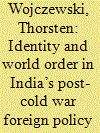

|
|
|
|
|
| Summary/Abstract |
This article examines the dominant conception of world order in India’s post-Cold War foreign policy discourse. Drawing on a poststructuralist, discourse-theoretical framework, I argue that the discourse uses foreign policy and world order as sites for the (re-)production of India’s identity by placing India into a system of differences that constitutes ‘what India is’. The article shows that India’s foreign policy discourse frames world order in accordance with India’s own national experiences and thus seeks to upheave India’s identity to a position from where it can represent the universal: a global political community. This notion of Indian Exceptionalism constitutes the affective dimension of the discourse that obscures the absence of an extra-discursive foundation on which national identities could be grounded by endowing the Self with an imaginary essence and seemingly unique qualities.
|
|
|
|
|
|
|
|
|
|
|
|
|
|
|
|
| 6 |
ID:
164028


|
|
|
|
|
| Summary/Abstract |
The safe and just space framework devised by Raworth calls for the world’s nations to achieve key minimum thresholds in social welfare while remaining within planetary boundaries. Using data on social and biophysical indicators provided by O’Neill et al., this paper argues that it is theoretically possible to achieve a good life for all within planetary boundaries in poor nations by building on existing exemplary models and by adopting fairer distributive policies. However, the additional biophysical pressure that this entails at a global level requires that rich nations dramatically reduce their biophysical footprints by 40–50%. Extant empirical studies suggest that this degree of reduction is unlikely to be achieved solely through efforts to decouple GDP growth from environmental impact, even under highly optimistic conditions. Therefore, for rich nations to fit within the boundaries of the safe and just space will require that they abandon growth as a policy objective and shift to post-capitalist economic models.
|
|
|
|
|
|
|
|
|
|
|
|
|
|
|
|
| 7 |
ID:
164030
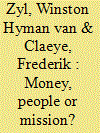

|
|
|
|
|
| Summary/Abstract |
Little is known about how ownership affects accountability in non-governmental organisations (NGOs). This article explores differences between locally- and non-locally-owned NGOs in South Africa. Our data suggest that locally-owned NGOs more often claim to implement downward and internal accountability mechanisms, while non-local NGOs more often claim to implement upward accountability mechanisms. Bigger NGOs also perform better at downward and upward accountability mechanisms than smaller ones. The data suggest there is much these organisations can learn from each other to strengthen their accountability mechanisms. Furthermore, assuming there is a positive relationship between local ownership and development effectiveness, these findings may have important implications in furthering effective development interventions.
|
|
|
|
|
|
|
|
|
|
|
|
|
|
|
|
| 8 |
ID:
164033


|
|
|
|
|
| Summary/Abstract |
Using van Dijk’s critical discourse analysis, this paper attempts to analyse the ways in which the Islamic Republic of Iran is constructed as a security threat in US congressional hearings. The article is based on the case of the two-day congressional hearing on post-JCPOA (Joint Comprehensive Plan of Action) held by the US Senate Committee on Banking, Housing, and Urban Affairs, on 24–25 May 2016. The session was presumably held to examine ‘sanctions relief’ provided to Iran; however, the study reveals that through the use of discursive tools such as lexical style and argumentation, Iran is framed and evaluated as a security threat to (1) the US; (2) US allies, specifically Israel; and (3) the international community. This construction reflects the established political and ideological stereotypes and also orientalist clichés which have led to Otherisation and vilification of Iran. Therefore, by representing Iran as an ‘irrational’, ‘radical’ and ‘barbaric’ entity, the US discrimination against Iran through sanctions and other unilateral political decisions is legitimised and justified.
|
|
|
|
|
|
|
|
|
|
|
|
|
|
|
|
| 9 |
ID:
164027


|
|
|
|
|
| Summary/Abstract |
In the throes of war, protecting such cultural heritage as the Bamiyan Buddhas, the Mostar Bridge, the Timbuktu libraries and Palmyra supposedly is a priority on the international public policy agenda; but government responses so far have been limited to deploring such destruction. This article explores the evolving, albeit contested, norm of the ‘responsibility to protect’ (R2P) and its relevance for cultural heritage. There is no need for a hierarchy of protection – civilians or culture – because the juxtaposition is as erroneous as choosing between people and the environment. This essay begins with a discussion of cultural heritage and defines the scope for the application of any new international normative consensus. It then explores why R2P, in the original concept of the International Commission on Intervention and State Sovereignty (ICISS), is an appropriate framework for thinking about cultural protection, despite considerable political headwinds. It then examines the current opportune political moment and existing legal tools. Finally, there is a brief consideration of the obstacles facing the creation of a better framework for cultural protection in zones of armed conflict.
|
|
|
|
|
|
|
|
|
|
|
|
|
|
|
|
| 10 |
ID:
164035


|
|
|
|
|
| Summary/Abstract |
Social relations, institutional arrangements and cultures bequeathed by South Africa’s system of apartheid continue be felt in the present despite the country’s formal transition to democracy 25 years ago. Race, class and gender inequities continue to structure South African society in ways that have proven intransigent to change, leading to growing frustration and widespread public dissatisfaction expressed in multiple arenas including worker strikes, service delivery and university student protests. While it is clear that social structures inherited from the past are difficult to change, it is also the case that change does happen. In this paper, we discuss the findings of a hermeneutic phenomenological study with 10 academics at one historically White university in South Africa, who have been agents of change within their particular context. We show how participants engaged in struggles to counter resistance to their efforts. In doing so they demonstrate what we call ‘strategic competence’ – the ability to act in ways that not only draw on personal resources but recognise the resources, contradictions and opportunities offered within the existing limitations of the social structure. Strategic competence thus emerges as a central feature of agency, enabling individuals to stretch the boundaries of what is possible.
|
|
|
|
|
|
|
|
|
|
|
|
|
|
|
|
| 11 |
ID:
164036


|
|
|
|
|
| Summary/Abstract |
Despite the attention to gender and conflict in empirical positivist peace research, and the interest in local agency in recent peacebuilding literature, women’s understandings and lived experiences of peacebuilding are not necessarily well accounted for. This article, drawing on interviews, focus groups and observation research with 57 female victims/survivors of post-election violence in Kenya, provides an ethnographic study of women’s largely informal peacebuilding activities, ranging from mediation and dialogue to economic empowerment. It analyses women’s constructions and ways of making sense of being peacebuilders, demonstrating that, while participants employed dominant gender frames, they exerted considerable transformative agency in their communities. It argues that their ‘gendered responsibility for peace’ at community level is simultaneously empowering and disempowering. The research aims to increase understanding of the gendered nature of peacebuilding and the ways in which women exercise peacebuilding agency through a focus on their own voices and lived experiences.
|
|
|
|
|
|
|
|
|
|
|
|
|
|
|
|
|
|
|
|
|